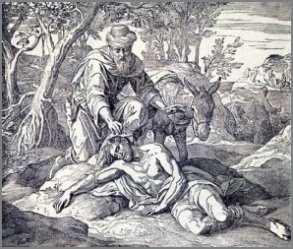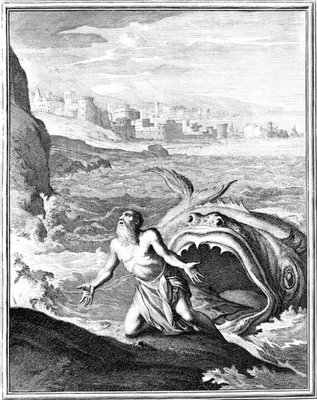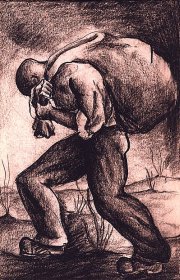Quote of the Day - Jan 29/06
Harlan Ames - Gleanings 9.333
agonizomai (Greek): to strive, fight, labour fervently
“Strive to enter through the narrow door. For many, I tell you, will seek to enter and will not be able..."
Luke 13:24

"...as sin came into the world through one man and death through sin, and so death spread to all men because all men sinned..." {Ro 5:12}yet we bear also in mind that...
"The fathers shall not be put to death for the children, nor shall the children be put to death for the fathers; every man shall be put to death for his own sin..." {De 24:16}If the city had not repented and God had not shown mercy then the children would undoubtedly have suffered in the same catastrophe as the older citizens. Their eternal end would simply not have been the same. This is the best verse I have so far found in the Bible for the special treatment of infants of unaccountable age. It is arguable, but it is far better than the one most often quoted in 2Sa 12:22-23.

We know that in everything God works for good with those who love him, who are called according to his purpose. For those whom he foreknew he also predestined to be conformed to the image of his Son, in order that he might be the first-born among many brethren. And those whom he predestined he also called; and those whom he called he also justified; and those whom he justified he also glorified. {Ro 8:28-30}Also, God does not use people based on how perfect they are, either. I’m not advocating that we strive for imperfection nor that we lay indolently in it – I’m only saying that if God waited to use only perfect people then Christ came in vain. The glory of God is that He accomplishes all His will through those who are in rebellion against Him, and through those saints of His who stumble and falter along the way. And we all stumble and falter. And a part of God’s will is that we be sanctified by His grace through faith, which He does in us while He works through us. Astounding!

Not that I complain of want; for I have learned, in whatever state I am, to be content. I know how to be abased, and I know how to abound; in any and all circumstances I have learned the secret of facing plenty and hunger, abundance and want. {Php 4:11-12}Make no mistake, Jonah was in great discomfort - so much so that he asked to die. I like the fact that he asked. That shows that, like Job, he knew Who gives and Who takes away. I have never been exposed to such heat, but I have had a similar experience with cold - where I lay in the snow on a deserted street and just wanted it all to be over (or thought that I did).


"Blessed are those who are persecuted for righteousness’ sake, for theirs is the kingdom of heaven. Blessed are you when men revile you and persecute you and utter all kinds of evil against you falsely on my account. Rejoice and be glad, for your reward is great in heaven, for so men persecuted the prophets who were before you." {Mt 5:10-12}So often we will find that so-called saints are no better – in fact they are worse than those in the world. God takes us where he finds us and then proceeds to form Christ in us. Some of us are pretty far gone when we’re found - so we don’t look like saints to the casual glance. If you look at all the main characters in the Bible but Christ, you will find at least one prepossessing flaw that will make you shake your head - that is, until you begin to know yourself.

 It seems that Jonah had an excuse after all, before he ran at the outset. He wouldn’t give Nineveh the message because he knew God would be merciful anyway. He was wrong. Jonah's preaching was the ordained means by which God’s mercy was expressed to Nineveh, and by which God brought them to repentance. Faith comes by hearing and hearing by the Word of God (or the preaching of Christ). {Ro 10:17} Wrong thinking springs from wrong premises. God uses means to achieve His ends. Jonah was off base to begin with.
It seems that Jonah had an excuse after all, before he ran at the outset. He wouldn’t give Nineveh the message because he knew God would be merciful anyway. He was wrong. Jonah's preaching was the ordained means by which God’s mercy was expressed to Nineveh, and by which God brought them to repentance. Faith comes by hearing and hearing by the Word of God (or the preaching of Christ). {Ro 10:17} Wrong thinking springs from wrong premises. God uses means to achieve His ends. Jonah was off base to begin with.
Yet 40 days and Nineveh shall be overthrown.



 The decree of the King was not what turned the Ninevites. It wasn’t "follow the leader, whether you agree or not". It was the leader hearing that the people had believed the preaching of Jonah about impending judgment and showing leadership as to how they might all demonstrate their contrition.
The decree of the King was not what turned the Ninevites. It wasn’t "follow the leader, whether you agree or not". It was the leader hearing that the people had believed the preaching of Jonah about impending judgment and showing leadership as to how they might all demonstrate their contrition. This is true preaching. Preaching to the perishing must include an element of "repent and believe the gospel" so that people will wish to be saved from and the wrath of God, against Whom their sin offends. The message to the Ninevites was not "God loves you," but "God is offended with your sin and (unless you repent) He will destroy you; judgment is coming!" In fact, repentance wasn’t mentioned, but simply that judgment was coming.
This is true preaching. Preaching to the perishing must include an element of "repent and believe the gospel" so that people will wish to be saved from and the wrath of God, against Whom their sin offends. The message to the Ninevites was not "God loves you," but "God is offended with your sin and (unless you repent) He will destroy you; judgment is coming!" In fact, repentance wasn’t mentioned, but simply that judgment was coming.
 It wasn’t because of the sackcloth and ashes that God relented. It was because they believed His word. It wasn’t even because they repented – because their repentance was a result of first believing. Faith comes by hearing and hearing by the Word of God (or, by the preaching of Christ). Faith is sometimes called a mystery. How one person believes and another does not when hearing the same word is wrapped up in the counsels of God. But it is God Who regenerates according to His will - and it is as a result of this regeneration that men believe and repent. It would be a grave error to conclude that the one who believed did so because he was humbler/smarter/better than the other. We must ask the question, "Who makes one to differ from another?" {1Co 4:7} As the Bible in Basic English has it...
It wasn’t because of the sackcloth and ashes that God relented. It was because they believed His word. It wasn’t even because they repented – because their repentance was a result of first believing. Faith comes by hearing and hearing by the Word of God (or, by the preaching of Christ). Faith is sometimes called a mystery. How one person believes and another does not when hearing the same word is wrapped up in the counsels of God. But it is God Who regenerates according to His will - and it is as a result of this regeneration that men believe and repent. It would be a grave error to conclude that the one who believed did so because he was humbler/smarter/better than the other. We must ask the question, "Who makes one to differ from another?" {1Co 4:7} As the Bible in Basic English has it...For who made you better than your brother? or what have you that has not been given to you? but if it has been given to you, what cause have you for pride, as if it had not been given to you?

 So in God’s dealing with Jonah He is teaching and actually forming compassionate and non-judgmental attitudes. But don’t confuse what God is doing in Jonah with what God is doing in the Ninevites. In other words, speaking the truth in love must be the motive of all good preaching (and Jonah presently lacks the love part) – but the Truth is precisely what the Ninevites need to hear – and the Truth often sounds hard and unloving.
So in God’s dealing with Jonah He is teaching and actually forming compassionate and non-judgmental attitudes. But don’t confuse what God is doing in Jonah with what God is doing in the Ninevites. In other words, speaking the truth in love must be the motive of all good preaching (and Jonah presently lacks the love part) – but the Truth is precisely what the Ninevites need to hear – and the Truth often sounds hard and unloving. But we have gone on ahead. Jonah is preaching the dire consequences of sin to the Ninevites - and quite rightly so! They are sinners under the condemnation of God and under His wrath are liable to His judgment. It needed to be said and it even needed to be said in the way it was said. They were so far gone that they simply would not hear the gentle voice. They had hardened their own hearts. Though God will never break a bruised reed nor quench a smoking flax there must first be both bruising and smoke. If there is not fire at all, then no amount of fanning will produce flame. There can only be smoke where there is first fire.
But we have gone on ahead. Jonah is preaching the dire consequences of sin to the Ninevites - and quite rightly so! They are sinners under the condemnation of God and under His wrath are liable to His judgment. It needed to be said and it even needed to be said in the way it was said. They were so far gone that they simply would not hear the gentle voice. They had hardened their own hearts. Though God will never break a bruised reed nor quench a smoking flax there must first be both bruising and smoke. If there is not fire at all, then no amount of fanning will produce flame. There can only be smoke where there is first fire.
 Jonah has not been forced to do that which he did not want to do. This is not what God is like. Force is not generally how God’s sovereign will overarches man’s own. But Jonah has nevertheless been made willing by God. We are reminded of in Ps 110:3 "Thy people shall be willing in the day of Thy power..." (shall be "willingness" or a "freewill offering" - see Ro 12:1) And the means by which they are made willing do indeed include some very hard things. Did God bring these hard things upon Jonah out of dictatorial glee, or was it out of love? And so, are not the hard things in our own lives also brought in love from God? And ought we not to receive them as such? In fact, aren’t the hard things often simply God allowing us to suffer, for a while, the consequences of our own sin, before reviving us? Doesn’t He simply turn our evil to our good? And aren’t we tempted to slanderously blame Him instead of ourselves – to complain instead of giving thanks?
Jonah has not been forced to do that which he did not want to do. This is not what God is like. Force is not generally how God’s sovereign will overarches man’s own. But Jonah has nevertheless been made willing by God. We are reminded of in Ps 110:3 "Thy people shall be willing in the day of Thy power..." (shall be "willingness" or a "freewill offering" - see Ro 12:1) And the means by which they are made willing do indeed include some very hard things. Did God bring these hard things upon Jonah out of dictatorial glee, or was it out of love? And so, are not the hard things in our own lives also brought in love from God? And ought we not to receive them as such? In fact, aren’t the hard things often simply God allowing us to suffer, for a while, the consequences of our own sin, before reviving us? Doesn’t He simply turn our evil to our good? And aren’t we tempted to slanderously blame Him instead of ourselves – to complain instead of giving thanks?But we have this treasure in earthen vessels, to show that the transcendent power belongs to God and not to us. {2Co 4:7}Jonah will now obey willingly, but he will do so by the grace of God. This is how we should all see our obedience; not as something we cough up out of our own goodness and offer to God (sacrifice), but as something God has worked in us by His grace (mercy).
For I desired mercy, and not sacrifice; and the knowledge of God more than burnt offerings. {Ho 6:6}And it is grace that has revived Jonah so that grace may be brought to Nineveh. Christ is in all and through all. What care and mercy we see that God revives Jonah and restores him to ministry in the task in which he had failed. Yet this does not mean that Jonah is now perfect in his obedience and motivation. Some will argue that it is possible for saints to attain to that – but, as long as we dwell in mortal flesh alongside our old carnal nature, there will always be something in need of the grace of God to overcome it.

 When I look at a disarming little baby cooing and gurgling with innocence, when I see those cute little corners of its mouth curled upwards in a gummy grin, when those huge wet eyes sparkle at me from that oversized head - then something stirs deep within me. I melt inside and my own eyes become teary. It feels as though something in my chest is aching and straining to envelop that pristine little life form with a flood of protective love. I fall in love for a second or two with helplessness, and I let another being into my soul. Do you feel that way? I’ll bet you do. And there would be precious few who would feel otherwise.
When I look at a disarming little baby cooing and gurgling with innocence, when I see those cute little corners of its mouth curled upwards in a gummy grin, when those huge wet eyes sparkle at me from that oversized head - then something stirs deep within me. I melt inside and my own eyes become teary. It feels as though something in my chest is aching and straining to envelop that pristine little life form with a flood of protective love. I fall in love for a second or two with helplessness, and I let another being into my soul. Do you feel that way? I’ll bet you do. And there would be precious few who would feel otherwise.
 When we give thanks in all things then the burden is truly light, as the Saviour promised it would be. Though we may still have to go through the trial - or more likely as in this case, the chastisement - yet He is with us and that is just as good as if we had been spat out unharmed on the other side the trouble. Again, wasn’t it Christ Who promised that not a hair of our heads would perish? It won’t. All we have to do is to abide, trust, endure, remain and keep on in faith until the end. I say “all”, but this "all" would itself be impossible but for He Who is in us both to will and to do of His good pleasure.
When we give thanks in all things then the burden is truly light, as the Saviour promised it would be. Though we may still have to go through the trial - or more likely as in this case, the chastisement - yet He is with us and that is just as good as if we had been spat out unharmed on the other side the trouble. Again, wasn’t it Christ Who promised that not a hair of our heads would perish? It won’t. All we have to do is to abide, trust, endure, remain and keep on in faith until the end. I say “all”, but this "all" would itself be impossible but for He Who is in us both to will and to do of His good pleasure.
 Is it the vow of thanksgiving that causes God to deliver Jonah? No! The vow of thanksgiving is Jonah’s response to God’s mercy and deliverance. It is by definition giving thanks for something already bestowed. This is the principle throughout the Bible. It is at the root of Habakkuk’s and of Paul’s statements (Romans and Galatians) that the just shall live by his faith and that salvation, which belongs to the Lord is by faith alone, apart from works of the law – apart from any works at all. God has made it so that all we can do is render thanks; thanks with our whole being, substance, heart and will. (With all our heart and with all or mind and with all our soul and with all our strength). If He had not done so then we would glory in our "part".
Is it the vow of thanksgiving that causes God to deliver Jonah? No! The vow of thanksgiving is Jonah’s response to God’s mercy and deliverance. It is by definition giving thanks for something already bestowed. This is the principle throughout the Bible. It is at the root of Habakkuk’s and of Paul’s statements (Romans and Galatians) that the just shall live by his faith and that salvation, which belongs to the Lord is by faith alone, apart from works of the law – apart from any works at all. God has made it so that all we can do is render thanks; thanks with our whole being, substance, heart and will. (With all our heart and with all or mind and with all our soul and with all our strength). If He had not done so then we would glory in our "part".
 Jonah never bowed to a vain idol – except that of his own will – except that of despising the Ninevites – except that of his own thoughts. I don’t think of Jonah referring here to the sailors, and them praying each to his own god aboard the foundering ship. Didn’t these men hear of the One True God and fear Him? Didn’t they make vows to Him? Is it supposed that, when the peril had passed, the sailors went right back to their old ways? We aren’t told. We only have the examples of human nature so vividly portrayed to us in the history of the Israelite nation. And we know that within 40 years of this book Assyria itself overthrew Israel, whose God had saved a prior generation of their people.
Jonah never bowed to a vain idol – except that of his own will – except that of despising the Ninevites – except that of his own thoughts. I don’t think of Jonah referring here to the sailors, and them praying each to his own god aboard the foundering ship. Didn’t these men hear of the One True God and fear Him? Didn’t they make vows to Him? Is it supposed that, when the peril had passed, the sailors went right back to their old ways? We aren’t told. We only have the examples of human nature so vividly portrayed to us in the history of the Israelite nation. And we know that within 40 years of this book Assyria itself overthrew Israel, whose God had saved a prior generation of their people.
"When my soul fainted within me, I remembered the LORD; and my prayer came to thee, into thy holy temple."
 It was when Jonah remembered the LORD that the peace came. Until then he was fainting – the weeds were entangling his head and he was pressed down to the base of the mountains at the bottom of the deep – into the depths of the pit. Have you been there? Have you sinned so badly that you almost forgot the God of grace and mercy that called you out of the darkness into His wonderful light? God granted Jonah the remembrance of His grace and mercy and gave him repentance.
It was when Jonah remembered the LORD that the peace came. Until then he was fainting – the weeds were entangling his head and he was pressed down to the base of the mountains at the bottom of the deep – into the depths of the pit. Have you been there? Have you sinned so badly that you almost forgot the God of grace and mercy that called you out of the darkness into His wonderful light? God granted Jonah the remembrance of His grace and mercy and gave him repentance.In my distress I called upon the LORD; to my God I cried for help. From his temple he heard my voice, and my cry to him reached his ears. {Ps 18:6}He had considered himself to have been cast out from God’s presence (v.4). This is worth noting. Jonah’s concept of God’s presence was apparently not the best. He had tried fleeing from Him (an impossibility) and now he presumed he was out of God’s presence - another impossibility for we read of God...
If I ascend to heaven, thou art there! If I make my bed in Sheol, thou art there! {Ps 139:8}This is the illogicality of the sinful mind. God is not like we might sometimes think when we see Him as we are. He is not vindictive. We again join the Psalmist who says...
If thou, O LORD, shouldst mark iniquities, Lord, who could stand? But there is forgiveness with thee, that thou mayest be feared. {Ps 130:3-4}God never abandons those who belong to Christ. In fact, Christ has prayed for all those that are His – that the faith they had been given through hearing would not fail, {Joh 17:7-10} and so it can never do so. Elsewhere, Christ thanked the Father that He always heard Him. {Joh 11:41-42}
 And why is this so clear? Because Jonah’s consignment to the depths of the sea, where the bars closed upon him forever and where he was in the very depths of the Pit, is a picture of the descent of the Lord into the Pit, which He did on our behalf to unlock the bars of our eternal condemnation for sin. In it is the cry of Christ our Saviour Himself praying to His God (the Father) out of the depths of the sin of his people, and for His people. "Eloi, Eloi - lama sabachthani," was a cry of one abandoned and drowning in the depths of the sea – in the very depths of the Pit. Not overcome by sin, but overcome by the horror and consequences of bearing it.
And why is this so clear? Because Jonah’s consignment to the depths of the sea, where the bars closed upon him forever and where he was in the very depths of the Pit, is a picture of the descent of the Lord into the Pit, which He did on our behalf to unlock the bars of our eternal condemnation for sin. In it is the cry of Christ our Saviour Himself praying to His God (the Father) out of the depths of the sin of his people, and for His people. "Eloi, Eloi - lama sabachthani," was a cry of one abandoned and drowning in the depths of the sea – in the very depths of the Pit. Not overcome by sin, but overcome by the horror and consequences of bearing it.



 Can faith ever become a work? It seems like a silly question but I don’t think it is. If there is any possibility that it can, then there is a whole class of people out there who are going down into the pit without realizing it.
Can faith ever become a work? It seems like a silly question but I don’t think it is. If there is any possibility that it can, then there is a whole class of people out there who are going down into the pit without realizing it. Yet, so insidious and vile is sin that, even in believers, it clings with a tenacity which only Christ can release for us. Sin is a disease that runs through and through our entire being. In the same way that the body’s cells are totally replaced every seven years, so in our sanctification we must be totally replaced with something made by Christ. That He partially does this while we are living on earth, without us losing our actual identity, is something that testifies to His power of creative Deity.
Yet, so insidious and vile is sin that, even in believers, it clings with a tenacity which only Christ can release for us. Sin is a disease that runs through and through our entire being. In the same way that the body’s cells are totally replaced every seven years, so in our sanctification we must be totally replaced with something made by Christ. That He partially does this while we are living on earth, without us losing our actual identity, is something that testifies to His power of creative Deity.
 This is the part of the story that often gives rationalizers trouble. Never mind the fact that Christ our God and Saviour referred to this historical event during His ministry (as well as to Noah and to Adam) – some people still have problems with it. It is true that Christ never specifically said it was history – but neither did he say it was "myth". These things are much too serious for the Lord to leave in doubt; so let us use the rules of sound hermeneutics and receive this whole story as literal historical truth, because that is how it presents itself.
This is the part of the story that often gives rationalizers trouble. Never mind the fact that Christ our God and Saviour referred to this historical event during His ministry (as well as to Noah and to Adam) – some people still have problems with it. It is true that Christ never specifically said it was history – but neither did he say it was "myth". These things are much too serious for the Lord to leave in doubt; so let us use the rules of sound hermeneutics and receive this whole story as literal historical truth, because that is how it presents itself.He (King Jereboam II of Israel) restored the border of Israel from the entrance of Hamath as far as the Sea of the Arabah, according to the word of the LORD, the God of Israel, which he spoke by his servant Jonah the son of Amittai, the prophet, who was from Gath-hepher. {2Ki 14:25}...and I believe that God deliberately included this single reference in 2 Kings to confute those who would seek to throw doubt upon the historicity of the Jonah of this book, and his story.
"Though after my skin worms destroy this body yet in my flesh shall I see God." {Job 19:26}It is the same power that kept Jesus’ body from corruption and raised it to life again.

 Now do we see the truth in the Psalmist’s words...
Now do we see the truth in the Psalmist’s words..."If thou, O LORD, shouldst mark iniquities, Lord, who could stand? But there is forgiveness with thee, that thou mayest be feared." {Ps 130:3-4}Whereas before the sailors feared the elements, now they fear the God of the elements, whom they know to be the God of Jonah. Before salvation people are afraid of God because of His wrath against their sin - but after they come into His forgiveness in Christ and begin to know that His wrath against them has gone, they are afraid in a deeper and more reverent way. Who would not fear a God that could conceive and execute such a plan of salvation? What wisdom, and courage and truth and grace and love and mercy; what power and steadfastness and faithfulness and humility! How it exceeds our grasp and our ability and even our understanding! Yet we know it to be true of Him because His indwelling Spirit testifies to the Truth, as Job knew...
"I know that thou canst do all things, and that no purpose of thine can be thwarted. ‘Who is this that hides counsel without knowledge?’ Therefore I have uttered what I did not understand, things too wonderful for me, which I did not know. ‘Hear, and I will speak; I will question you, and you declare to me.’ I had heard of thee by the hearing of the ear, but now my eye sees thee; therefore I despise myself, and repent in dust and ashes." {Job 42:2-6}It is God’s wrath that drives men to Christ, but once they have obeyed God’s command to believe in the One Whom He has sent {Joh 6:29} it is His grace and love they abide in. Passing from death to life is passing from wrath to peace, from God’s fierce hatred to His abiding love.
